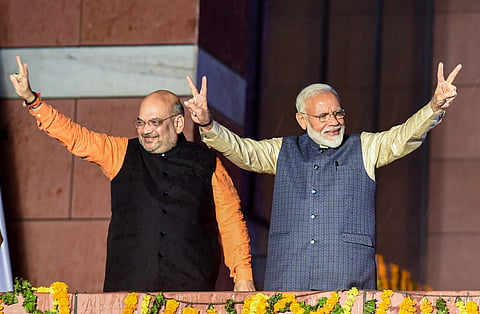Stunner of a verdict brings many leaders down to earth
At the end of the most viciously fought Lok Sabha elections this country has seen in recent memory, the Indian voter’s mind has been revealed - a second term for incumbent Prime Minister Narendra Modi with a bigger mandate. In the process, most opposition parties, including the main rival, the Congress, have been pulverised. Caught unawares by the NaMo wave in 2014, opposition parties believed they had given their best shot five years later, but Modi trumped all. Political pundits and media celebrities will now trot out multiple explanations for the final outcome, but one clear message is that voters felt there was no alternative to Modi. All the seats the BJP and its allies won or the percentage of votes they managed to poll may not only be due to a “positive vote” but also on account of the lack of a better option and the failings of other parties.
Aided by Modi’s personal appeal and factors like Balakot, the BJP managed to turn the election into a one-sided affair. The Congress also lacked a narrative to counter the BJP’s playbook. The NYAY scheme it thought would be the magic bullet to fetch votes, failed to percolate to the party cadre at the grassroots, let alone the electorate. On the contrary, at least three schemes of the NDA-free LPG connections (Ujjwala), building of toilets (Swachh Bharat) and the direct cash transfer to farmers scheme - had Modi’s stamp all over them.
The problem with most Indian political parties is that they still think the voter is naïve. They served the first serious warning to Trinamool chief Mamata Banerjee in West Bengal where the BJP notched an impressive double-digit tally in what was once a Left bastion. TDP chief Chandrababu Naidu paid the price for the way he allowed his party leaders to loot public money. In Karnataka, since the Congress and the JD(S), which came together after Assembly elections to form the government just about a year ago, spent more time fighting each other rather than addressing people’s problems, the voters gave them what they deserved.
Ditto Congress chief ministers in Madhya Pradesh, Rajasthan and Chhattisgarh where their party won Assembly polls close to six months ago; voters have given them a severe drubbing. In Bengal, the Left always treated Mamata as its primary enemy and allowed transfer of votes to the BJP. In the process, it has lost relevance in the state and is faced with a similar threat in Kerala, the only other state in its pocket. Like Mamata, K Chandrashekar Rao of the TRS, who got an emphatic second term as Telangana chief minister a few months ago, suffered severe jolts. The needless desertions the TRS encouraged from rival parties, the kind of arrogance that was on display and losing focus on the state while jockeying for space in Delhi - all of them combined to bring the ruling party leaders back to earth.
At the national level, it is more than likely that the Congress, which has hardly improved upon its performance in 2014, will see a clamour for change. It’s time the leadership moves out of the dynasty’s grip and the Congress learns to embrace emerging leaders representing different aspirational groups. Sticking to the old guard and nurturing mediocre leaders to protect the dynasty would amount to signing the party’s death warrant. They ought to remember that if this election saw over eight crore first-time voters, India will be adding 10 crore more by 2024. In other words, close to 70 per cent of voters would not have seen either Indira or Rajiv Gandhi.
In as much as Modi and his team can rejoice over this victory, what is important is they stay rooted. For this, Modi himself has to tweak the way he functioned during the first term, sharing stage with others and putting in place a system rather than driving every initiative himself. Having achieved a landslide victory, BJP leaders will hopefully indulge in less rabble rousing and not be acerbic about people who hold differing views. Politics apart, specific focus areas need to be identified quickly—like establishing a water/river commission for better harnessing of water to meet the needs of farmers, taking steps to kick off projects that have been stagnating and finding a negotiated settlement for the Ayodhya dispute by taking all stakeholders along.
ALSO READ:

